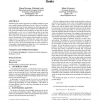Free Online Productivity Tools
i2Speak
i2Symbol
i2OCR
iTex2Img
iWeb2Print
iWeb2Shot
i2Type
iPdf2Split
iPdf2Merge
i2Bopomofo
i2Arabic
i2Style
i2Image
i2PDF
iLatex2Rtf
Sci2ools
ATAL
2003
Springer
2003
Springer
Towards a motivation-based approach for evaluating goals
Traditional goal-oriented approaches to building intelligent agents only consider absolute satisfaction of goals. However, in continuous domains there may be many instances in which a goal state can only be partially satisfied. In these situations the traditional symbolic goal representation needs modifying in order that an agent can determine a worth value of a goal state and also of any state approximating the goal. In our work we use the concept of worth in two ways. First, we propose a mechanism by which the worth of a goal is dynamically set as a function of the intensity of an underlying motivation. Second, we determine the worth of any state in relation to a goal through the use of a metric by which we can measure the proximity of an environmental state to a goal. In this way, it is possible to make judgements about the relative satisfaction an environmental state offers in regard to a goal. Categories and Subject Descriptors I.2.11 [Artificial Intelligence]: Distributed Arti...
| Added | 06 Jul 2010 |
| Updated | 06 Jul 2010 |
| Type | Conference |
| Year | 2003 |
| Where | ATAL |
| Authors | Stephen J. Munroe, Michael Luck, Mark d'Inverno |
Comments (0)

